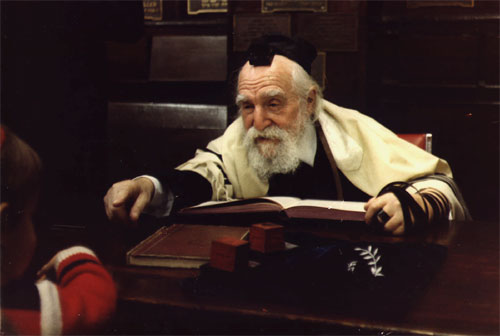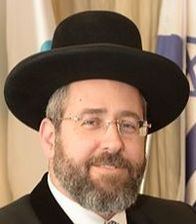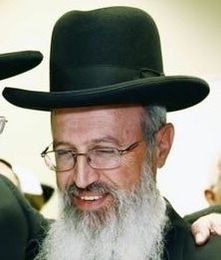Women Acting as Mashgiach

Rabbi Dr. Baruch Aaron Poupko, born in Velizh, Russia
to Rabbi Eliezer and Rebbetzin Pesha Poupko. He was a multi-lingual scholar, author and lecturer. He received rabbinic ordination from Rabbi Joseph Soloveitchik at the Rabbi Isaac Elchanan Theological Seminary in 1941. He served with distinction as Rabbi and later as Senior Rabbi of ShaAre Torah of Pittsburgh, PA (1942–2004). He was also President of the Rabbinical Council of Pittsburgh (1949–1999) and was one of the original founders of the Hillel Academy of Pittsburgh. He was one of the first Jewish leaders to advocate international efforts on behalf of Soviet Jews during the early 1950s, and wrote the award-winning Yiddish book In the Shadow of the Kremlin, as well as many articles regarding the plight of Soviet Jewry. Rabbi Poupko's doctoral thesis, completed at the University of Pittsburgh traces the history and status of Jewish religious adult education, analyzing the various emphases in curriculum of the three major religious ideologies." (American Jewish Year Book Vol. 66 (1965) 281) |
Yet in the USA women Mashgichos have been employed for decades, although this is mostly in out of the way small-towns. The basic Halacha is that ‘Eid Echad NeEman BeIssurin’ –‘a single witness (including a woman) is acceptable in matters of prohibition’
Nevertheless, the Torah instructs [Devarim 17:15] “You shall surely set over yourself a king…” which is interpreted to mean [Sifri 147] “’…a king…’ but not a queen” and this is documented by the RaMBaM (hil. Melachim 1:5) “So too all leadership appointments may only be held by men”. Tosafos, Ran, and others understand however, that this restriction applies exclusively to a woman being King. Rabbi Baruch Poupko (d. 2010) Rav of Shaarie Torah in Pittsburgh for 60 years, asked Reb Moshe in 1960 if a young widow might be employed as a Mashgiach, in fact to replace her deceased husband. Reb Moshe's response, published in Igros Moshe Yoreh Deah 2:44,45, clearly posits that a woman is credible and may act as Mashgiach. He explains that the Rambam's ruling that "all leadership appointments may only be held by men” is not applicable in this case since a Mashgiach is not really a position of authority and leadership. The Mashgiach is not the decision maker but a messenger, the eyes and ears of the rabbi. It is the rabbi who is ultimately responsible for the decisions and rulings determining the status of Kashrus. Those who are opposed seem to understand that a woman may not hold a position where she provides any instruction or oversight of men. |
|
Although Devorah is famous for being a Judge, it is clear that she was not a judge in the fullest sense since we rule that women may not serve as judges (Nidda 49b and Tosphos Bava Kamma 15a s.v. ‘Asher’)
Tosafos, Nidda 50a and Rashba, explain that Devorah did teach Halacha but the final rulings were not made by her, and in another opinion, disagreeing with the RaMBaM, Tosafos rule that a woman is only excluded from being a national leader, a king but can in fact act as a judge. It is suggested by the Aruch LeNer, also MaHaratz Chiyus Bava Kama 15, that Devorah's position as a Shofet was a special dispensation. They point to aberrations in the text, “And Devorah…she was a judge…at that time” both the redundancy of the pronoun, as well as the qualification, 'at that time’. |
information for this article culled from
My Wife the Kosher Mashgiach 21/09/09
Star K, one of the two most widely known kosher certification agencies, soon will be formally training women for the position of “Mashgiach,” a supervisor who certifies that food meets Jewish dietary laws.
The OU is also offering courses teaching women the intricacies of Jewish ritual dietary laws but is not yet formally training them to be Mashgiachs. However, officials did not rule out the possibility in the future.
A woman can certainly act as a Maschgiach, but the gender change has stirred up a controversy in the American religious community although it is pretty clear that women on the whole, have an innate perception that men usually do not. Ruth Greiter, a formally trained chef, told the New York Jewish Forward, "There are oversights that a man can make because he doesn’t know what to look for, they’re not raised in a kitchen. My daughters know it instinctively. The men have to be told.”
The OU is conducting a five-day advanced course for 25 women, who visit industrial kitchens. The Baltimore-based Star K operation, which already employs women as Mashgiachs in restaurants and hospitals, offers a two-day course for women.
In these courses, women do not undergo the same training as men, they do not visit slaughter houses nor train to make decisions concerning the Jewish law (Halacha) regarding Tereifos.
One of Star K’s longtime supervisors, Yael Kaner told the Long Island Jewish Star that despite her almost three decades of experience, people are often surprised to see her working as a Mashgiach. “People looking for the Mashgiach are often astonished to see me; What? A Mashgiach without a long beard?”






